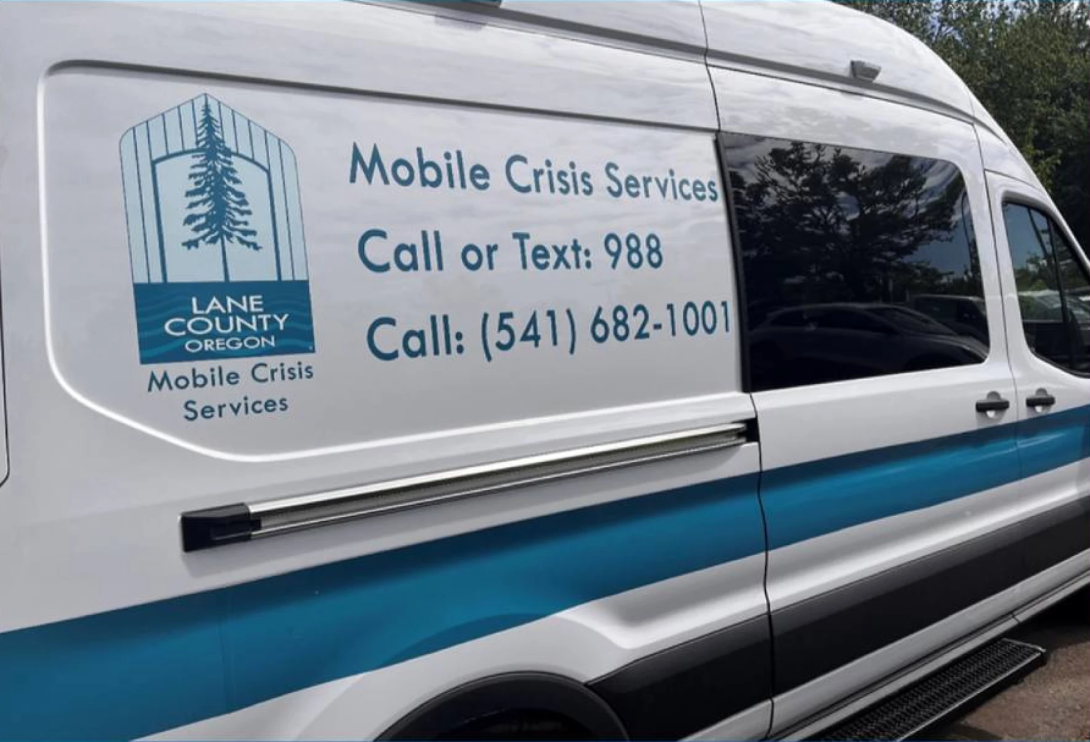
Lane County plans to expand its mobile crisis intervention program. This comes as a similar service operated by White Bird Clinic is dramatically scaling back.
Mobile Crisis Services of Lane County currently operates from 2 p.m. to 11 p.m., seven days a week. It works to deescalate people experiencing mental health crises and connect them with social services, sometimes in cooperation with law enforcement.
Julie Speir, a supervisor with the program, said the majority of the calls it receives are from Eugene or Springfield.
Later this month, the county will add another shift to the program, from 6 a.m. to 3 p.m. Speir said the hope is to reach 24/7 services this summer.
"That's our long term plan, and that's the state mandate, too," said Speir. "We've been in operation almost eight months, and have been building staffing and our program steadily."
Adapting to CAHOOTS cuts
Meanwhile, White Bird's mobile crisis service, CAHOOTS, is reducing its hours next week. The program is currently available 24/7 in Eugene, but will shrink to 11 a.m. to 11 p.m. on Fridays and Saturdays.
[The organization initially said the program would be cut back to "one shift per week," but staff confirmed to KLCC Wednesday that those plans had shifted.]
Speir said the county will have to adapt to those changes. She said CAHOOTS does extensive homeless and community outreach that stretches beyond her service's crisis-centered approach.
"We will probably see more expectation of responding to calls that may not necessarily be a mental health crisis, but may still be a community member in need," said Speir. "We want to be open to try and help fill that void so that the community is still feels supported."
Chelsea Swift, a CAHOOTS worker and union member, said she has concerns about that handoff. She said CAHOOTS has not had a formal training with the county to share the response strategies it built over decades.
"While there will still be a service seven days a week in Eugene when CAHOOTS services go down next week, this will still be a huge loss to the police alternative work that we do," said Swift.
Speir said the county has hired workers who have experience with vulnerable communities, and she's proud of the trust built with the public so far. She said some of the staff even have previous connections to White Bird.
Lane County’s service currently has 10 full-time responders, and Speir said it plans to hire another 10 workers in the coming weeks. She said the program would welcome workers who are leaving CAHOOTS to apply.
However, Swift said for some of her coworkers, the transition over to the county could be uncomfortable, as they'd be able to request involuntary mental health holds on clients for the first time.
"At the root of every CAHOOTS encounter that we have, we get to show up and say, 'Hi, I'm with CAHOOTS. We can't force you to do anything that you don't want to do,'" said Swift. "We feel really strongly that being a voluntary model is what has kept us and our clients safe for over 35 years."
In an email to KLCC, Speir said the county's program does have staff that can send a person to a hospital involuntarily. But she said that's only used as last resort when someone is a danger to themselves or others.
Funding for CAHOOTS
Amee Markwardt, White Bird Clinic's interim executive director, told KLCC last month that the nonprofit is facing a budget shortfall. But she said she's seeking new sources of funding, and hopes these cuts to CAHOOTS will be temporary.
In a budget discussion in February, Eugene City Manager Sarah Medary discussed potentially eliminating the city's contract with CAHOOTS—citing overlap with what Mobile Crisis Services of Lane County was providing.
Swift argued there is always need in the community for more alternative response programs.
"The future should look like collaboration and showing up for our clients [holistically] as a community, and getting back to a community-based response," said Swift. "There's a lot of room in the future for collaboration that I hope does not get missed."
